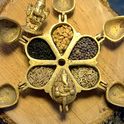Are the pine nuts sold at Whole Foods Market "safe" for those of us who experience "pine mouth, a horrible metallic aftertaste that lingers for weeks?
I noticed on the bag that I picked up there (but didn't buy) that they were packaged in China. I know from other reading that many pine nuts from China cause that problem. It seems to be the variety of pine nuts, though, not the location, as the offending variety can be, and is, grown in other places. Does anyone who experiences pine mouth know for sure? (As those with firsthand knowledge will understand, I'm not going to experiment!) Thank you so much. ;o)
10 Comments
I've restricted (resigned ) myself to buying the 'Chilgoza' from Indian grocery stores. I tend to use pine nuts sparingly and for my home cook needs. the flavor seems to suffice.
If I can't identify the provenance I don't buy them. I usually get them at Italian markets, or look for pinons from the southwest.



